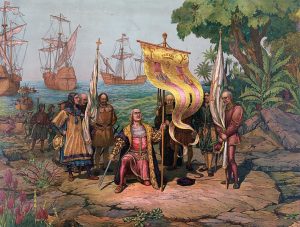
American Literature as it is known today began to be recorded at the end of the 15th century and beginning of the 16th. These early writings consisted largely of explorers taking note of their discoveries and explorations for European readers back home. Many of these writers, which included the likes of Christopher Columbus, Bartolomé de las Casas, and Álvar Núñez Cabeza de Vaca, came from a variety of different backgrounds, roles in exploration, and viewpoints. This would lead their writings to understandably have very different attitudes towards what they would find, and give an in-depth look into the complex relationship that the Spaniards (or servants of Spain in Columbus’ case) had with the land they were tasked with exploring.
One prominent writer of note from this period was Columbus, the Italian navigator who through a navigation error while on a mission for the monarchy of Spain accidentally brought about first contact of Spain with the New World. His expedition being the first to reach the Americas, his writings come from the very early years of exploration and consist mainly of information about the new lands that had as of yet been unseen by European eyes. Significant writings of his include letters to notable dignitaries such as court official Luis de Santangel in his first voyage and Ferdinand and Isabella, the monarchs of Spain, in his fourth. These letters read very much like he is trying to sell to them his new discoveries, in the hope of recognition for his accomplishments and further investment in his voyages. He describes lush and beautiful landscapes filled with abundant resources and timid, peaceful people. His true motives lie in taking advantage of these discoveries, declaring “of them all I have taken possession for [the king and queen], by proclamation made and with royal standard unfurled, and no opposition was offered to me” (Columbus 35). These letters reveal Columbus to be exploitative, thinking only of his own agenda, and leading Europe on the path it would take for the next few centuries of invading and imprinting into the Americas and throwing the natives aside.
Another writer of this period whose writings provide a stark contrast to those of Columbus was Bartolomé de las Casas. A Spanish priest who first visited the New World in 1502, about a decade after Columbus’ first landing, he would go on to spend much of his life in the Americas, taking part in early colonization efforts and observing the interactions between the Spanish and the natives. These observations would lead him to be a vocal critic of the barbaric treatment of the natives by the Spanish, decrying the atrocities as counter-intuitive to the Christian beliefs the Spanish claimed to be spreading. He recognized the effort begun by Columbus under the pretenses of converting the native population as the genocide it had become, saying of Hispaniola “This was the first land in the New World to be destroyed and depopulated by the Christians, and here they began their subjection of the women and children, taking them away from the Indians to use them and ill-use them, eating the food they provided with their sweat and toil” (De Las Casas 39). His descriptions, like Columbus’, paint the natives as being very different and “other”, yet he strives to reach out for their protection and the end of the tyranny forced onto them. De las Casas uses his accounts to further the sensationalism of America as an exotic and beautiful land, but strives to make apparent the injustices currently being committed in the exploration of it.
Álvar Núñez Cabeza de Vaca presented an account that differed greatly from those of Columbus and de las Casas. He first arrived in the New World in 1527, decades after these two first arrived and at a time in which the Spanish were now well into exploration of lands beyond the West Indies. In his travels, he would visit Hispaniola as well as the lands that would become Florida, Mexico, and the American Southwest. At a certain point he would become separated from his Spanish compatriots and live at times as prisoner and at others as guest to the various native people groups he would encounter. His accounts of the natives were very anthropological, observing the natives’ customs and reporting on what he saw. De Vaca viewed natives in a very similar light as he did Europeans, viewing them all as simply human beings, a view furthered by experiences with the natives in which they shared suffering. When finally reuniting with the Spanish, he no longer viewed his people in the same light, recognizing the evils they were capable of. Following his introducing a number of the natives to the Spanish, he would come to a revelation that “we often misjudge the motives of men; we thought we had effected the Indian’s liberty, when the Christians were but poising the pounce” (De Vaca 51). De Vaca finally gives us an account that is no longer Eurocentric, and gives the natives the recognition they deserve as made up of many diverse peoples, and having just as much of a society as the Europeans.
These writers provide us with a complex view of the Americas, giving us a deeper look into the events and attitudes surrounding this new land as exploration by the people who would eventually come to dominate it started to commence.
Works Consulted
“Christopher Columbus.” Christopher Columbus – Wikimedia Commons, commons.wikimedia.org/wiki/Christopher_Columbus. Accessed 12 September 2017.
Columbus, Christopher “Letter to Luis de Santangel Regarding the First Voyage.” The Norton Anthology of American Literature, 8th ed., vol. A, W.W. Norton, New York, 2012, 35-36.
De Las Casas, Bartolomé “The Very Brief Relation of the Devastation of the Indies.” The Norton Anthology of American Literature, 8th ed., vol. A, W.W. Norton, New York, 2012, 39-42.
De Vaca, Álvar Núñez Cabeza “The Relation of Álvar Núñez Cabeza de Vaca.” The Norton Anthology of American Literature, 8th ed., vol. A, W.W. Norton, New York, 2012, 44-51.